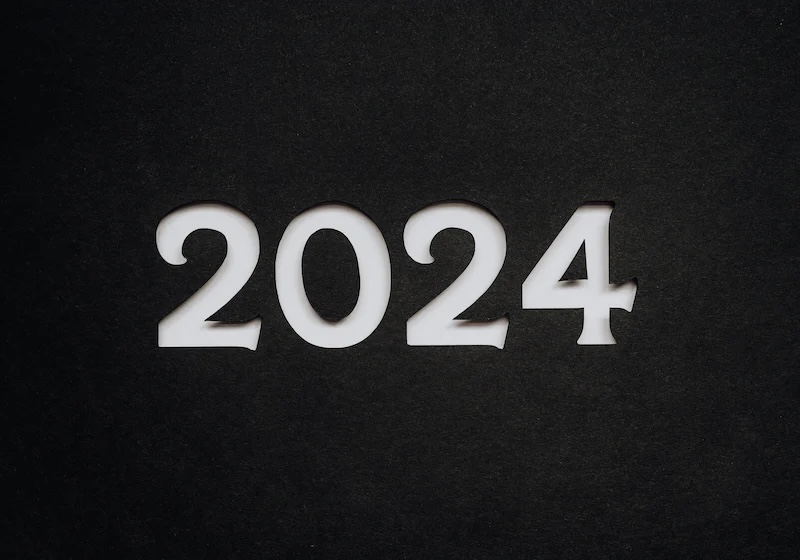
Having an estate plan should be a priority in 2024.
At the start of a new year, many people reflect on the past and set goals for the next twelve months.
For many, this involves dusting off the old dumbbells to "get fit."
Others may elect to "shop the perimeter" of the grocery store to prepare fresh and healthy meals.
We want to put more life in our years and add more years to our lives.
Alas, although these resolutions can help with both aspirations, death comes to us all.
According to a recent ElderLawAnswers article titled "New Year's Resolution: Get That Estate Plan Done," this fact makes estate planning essential.

Create or review your estate plan in 2024.
Unfortunately, estate planning can feel both uncomfortable and tedious.
I get that.
It is easy to make excuses like "My assets are too negligible to warrant an estate plan" or "I will address this later."
Although seemingly harmless, justifications like these can lead to significant issues in the future.
Trust be told, everyone needs an estate plan to help protect themselves and their loved ones.
Nobody can predict precisely when illness, accident, or death may strike.
Consequently, it would benefit you to start 2024 by either preparing or reviewing your estate plan.
Before you do, however, would a quick overview of some estate planning essentials help ease your stress?
Personally, I feel most vulnerable when I do not know what I do not know about something I really need to know.
If you feel that way about estate planning, then let's get started.
Right out of the chute, understand that you do not want to go it alone.
Estate planning is not a DIY project.
Save that for staining the deck or similar household project.
Too much is at stake.
You need the assistance of an experienced estate planning attorney.
Your attorney will begin with a thorough evaluation of your assets, circumstances, and goals.
After discussing this evaluation with you, your estate planning attorney will likely recommend and create an appropriate "life stage" estate plan unique to you.
A comprehensive estate plan may include a last will and testament, powers of attorney, trusts, and advance medical directives.
These estate planning legal documents can direct the distribution of property after you have died, minimize or avoid taxes, minimize or avoid probate, and even help protect investments and assets in the event of incapacity due to illness or disability.
The most recognizable estate planning document in American culture is the last will and testament.
What is a last will?
The last will is a legal document used to address how property, investments, other assets, and debts will be handled after the death of the testator (or testatrix, if female).
It is also used to nominate a guardian for minor children if both parents die and designate the executor to settle the estate under the directions provided in the document while also addressing any claims of creditors and beneficiaries.
When no last will exists, the laws of the state (known as laws of "intestate succession") determine how assets are distributed and who will serve as guardians for minor children.
By the way, do you really want a probate judge who does not know you and your family to decide who will rear your minor children to adulthood?
Even if you have few assets, it is essential to have a last will so your property and your loved ones will be under the care of people chosen by you rather than by a court that knows nothing of your personal preferences.
What information do you need to administer your estate plan after your death?
Proof of Identity
When the time comes for your estate plan to be administered after death, your executor will require pertinent identifying information.
You can save time - and money - by organizing this information now so the executor can access it later.
These may include relevant birth certificates, marriage or divorce certificates, Social Security cards, prenuptial agreements, and military service discharge papers.
Digital Asset Information
Much of modern daily life is conducted on computers, tablets, phones, or the internet.
Because many important documents and accounts exist online, having a digital vault, integrated password manager, or other system for managing digital assets should be prioritized.
If you die without an organized system, your digital and traditional assets may become inaccessible to your beneficiaries and executor while simultaneously vulnerable to fraud or identity theft.
Yikes!
Property Deeds and Titles
Tangible assets like homes, cars, and real estate have titles or deeds governing ownership.
If you have any of these assets, you should gather them and store them in a safe place.
One or two trusted individuals should be informed of the locations of these documents, too.
Debts
Although many people would love to have their debts disappear when they die, this is unrealistic.
If debts were forgiven at death, then there would be no incentive for making payments on what you owed in credit card debt, student loans, or mortgages.
Were that the case, then it would be best to wait and "put it to the man" at death.
In all seriousness, almost all debts (except some student loans) must be addressed by your executor when you die.
To simplify this task for your administrator, keep a list of debts with your estate planning legal documents and records.
Include auto loans, mortgages, credit cards, student loans, and personal loans with the contact information for the lender, login information, account numbers, and the approximate amount of debt.
If you rarely use certain credit cards, include those in the list so they can be closed and protected from identity theft.
Yes, thieves are heartless and prey on the living and the dead.
Assets with Named Beneficiary Designations
Not all assets pass through a last will or trust when you die.
Beneficiary designations govern some very significant accounts and assets.
Common examples include life insurance policies and retirement accounts.
These should be included in your estate plan.
Although beneficiary designations allow for the direct transfer to beneficiaries while bypassing probate, steps must still be taken to initiate the transfer.
What will the executor need to initiate the transfer of the asset?
The executor will need to give beneficiaries the name of the insurance company or financial institution, the location of policies, the account numbers, and the value of the assets.
Once the beneficiaries have received this information, they must provide a death certificate and their own personal identification information for assets to be released to them.
Financial Information
Since your finances are a foundational component of the estate plan, ensure your plan addresses your assets appropriately.
Create and maintain an accurate list of financial information with your credit cards, car insurance, health insurance, life insurance, home insurance, retirement plans, pension plans, and tax returns.
Funeral Wishes
Finally, you should address any final wishes regarding your funeral plans.
Because your loved ones will be grieving your loss, they may struggle in making decisions for your funeral.
Do you have a preference for burial or cremation?
Do you desire a full memorial service, or do you prefer a simple graveside ceremony?
Making, recording, and sharing these decisions in advance can help your loved ones know they are respecting your wishes.
If you have the time and money, you can even pay for these arrangements in advance to reduce the financial burden when you die.
What if you already have an estate plan?
Although those without an estate plan should prioritize creating one this year, those who already have a plan may still want to take action.
Estate plans must change as life changes.
Relationships, finances, and family dynamics can shift over time.
Moving from Kansas to Missouri (or vice versa) can trigger significant estate planning changes.
For this reason, you should review your estate plan every few years or after major life events.
If it has been a few years, now would be an excellent time to schedule a "full physical exam" of your estate plan and make any necessary updates.
Whether you are new to estate planning or need to refresh your existing plan, schedule a meeting with an experienced estate planning attorney.
This post is for informational purposes only and does not provide legal advice. You should contact an attorney for advice concerning any particular issue or problem. Nothing herein creates an attorney-client relationship between the Law Offices of Kyle E. Krull, P.A., and the reader.
REMEMBER: “The choice of a lawyer is an important decision and should not be based solely upon advertisements.”
This statement is required by rule of the Supreme Court of Missouri.
